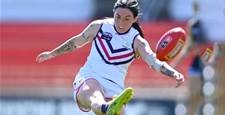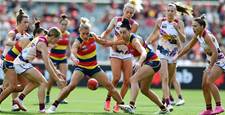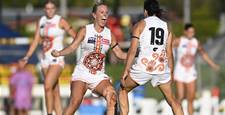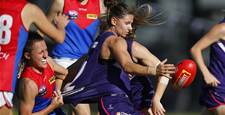Australia entered the second day of the Sydney Sevens, first in their pool.
After a fantastic first day at the Sydney 7s, which saw Australia win its first two pool games and outscore its opponents 67-0, the home nation was hoping to continue its winning streak on the second and final day of the tournament.
Australia started the day with their last pool match. This match proved to be it's most important in the pool stage. Whomever would win the Aussie-France game would be assured a place in the semi-finals.
Third Pool Game: Australia v France
The French were the first to show attacking strength, putting on the same pressure the Aussies faced when they lost to the French in last week’s Hamilton 7s, 3rd place final.
Australia were able to contain their familiar opponent and showed a physical defensive effort of their own.
However, the tide turned when Ellia Green picked up a loose ball and attempted to sprint forward. Brought down by a French player, Australia managed to remain in possession of the ball. They then continued to work their way forward through passing and running plays.
Australia broke the deadlock in the 4’ minute. After a series of attacking phases, Emma Tonegato picked up a loose ball at the 22-metre mark which Charlotte Caslick had dropped during a tackle. Tonegato then ran it for the host’s first try. After the conversion, Australia were up 7-0.
The French then tried to attack but found their attempts suffocated by a strong and physical Australian defence.
After the Aussies gained the ball and proceeded to pass it from right to left, Green then continued the scoring account. In the first seconds of extra time, she found space on the left-hand side of the pitch and ran a try in. This and the subsequent conversion put the Aussies up 14-0 entering half time.
âš¡ Ellia Green crossed for the @Aussie7s as they stormed into the semi-finals with a win over @francerugby. #Sydney7s
— RUGBYcomau (@rugbycomau) February 2, 2020
READ: https://t.co/aFuNeMM22F pic.twitter.com/VL3LoxQ2Rz
The second half started as the first half had proceeded. A good contest for both teams, it required a tough defensive effort by both the French and the Aussies.
The French were able to put their first points on the board in the 10’ minute. After Camille Grassineau picked up the ball off a French kick, she passed it to teammate Chloe Pelle. Despite being 10 metres in her own half the French woman ran it in for a try.
The scoreline was now 14-5, still in Australia’s favour.
Off the restart, France had another instant response. Séraphine Okemba used her height and was able to outjump Caslick to pick up the ball. She then ran the ball in for a second French try at the 11’ minute. After a second failed French conversion, the scoreline was Australia 14-10 France.
The French pressure continued and in the final seconds of the half they were in good scoring position, looking prime to get a try and win.
However, an Emilie Cherry interception, and subsequent kick out of bounds ensured the win and automatic Aussie progression to the semi-finals.
Through their final pool position, as the highest placed second-ranked team, the French also progressed to the semi-finals. A win over New Zealand would mean that the Aussies could meet them again in the final, should they also win their semi-finals. The same situation would occur if both of them lost.
The Australians next met with 3rd ranked Canada in the semi-final. A physical team like the French, this would not be an easy game for the home nation. Australia had met the Canadians 3 times this series, drawing once and losing twice.
The latest Australian loss to the Canadians was in the semi-finals of last weekend’s Hamilton 7s.
Semi-Final: Australia v Canada
The first half started with frenetic pace and physicality. The Australians initially had the ball but turned it over to the Canadians in their own half. After an injury to Emilee Cherry, Australia found themselves defending with only six women.
Due to this, the Canadians found space on the left-hand side of the pitch, scoring the first try of the game. Canada were up 5-0 in the 2‘ minute.
Cherry was replaced by Shannon Parry, after being pulled for a head injury assessment.
The home crowd cheered on their team, as the Aussies tried to move forwards against relentless Canadian pressure. After a turnover, Canada were on the attack again. However, a grubber kick by Canada towards the Australian try line was picked up by Ellia Greene.
A penalty though resulted in Canada regaining the ball. A disciplined Australian defence tried to contain their northern rivals. However, after several phases captain Ghislaine Landry received the ball off an offload and scored Canada’s second try. After the conversion, the Canadians were up 12-0 with one minute left in the first half.
The Aussies looked as if they were going to put points on the board before the half ended. A smart pass from Caslick to Tonegato resulted in the Aussies significantly gaining ground, entering the Canadian half. A second pass from Caslick to Tonegato looked like it would result in a try. However, the Aussies lost the ball after Tonegato tried to offload the ball back to Caslick. To make matters worse, captain Sharni Williams received a yellow for hair pulling.
The second half started with the Canadians gaining the ball. Facing only six Aussie players due to the yellow, Canadian Bianca Farella, the current rugby sevens number two points try scorer and joint most capped player, found a gap and ran in for Canada’s third try. The conversion put the Canadians up 19-0 at the 9’minute.
Canada then quickly followed this with another successive try in the 10’ minute, this time by Keyara Wardley. The scoreline moved to 24-0 in Canada’s favour.
The Aussies did not give up though. Facing Canada’s physical pressure, they tried to push forward, sometimes barreling into their Canadian opponents as Ellia Green did. Australia gained ground in successive phases.
However, after Canada regained possession and Keyara Wardley scored her second of the day after a good run. This put the Canadians up 29-0 with only two minutes remaining in the second half.
In the final minute of the match, Karen Paquin scored a fifth try for Canada, putting the home nations firmly out of first place final contention. The game ended 34-0 to Canada.
Bronze Medal Match: Australia v France
A loss to New Zealand in their semi-final sent France to face Australia in the bronze medal match, a second match-up between the two nations that day.
The field looked significantly different then it had in the early morning after several men’s matches had been playing on it in the pouring rain prior to the match.
This rain developed into thunder and lightning which pushed back the start time. After a half-hour delay due to lightning, the Australians came out with a clear determination to win. It turned into a physically brutal match, with several players finishing with visible facial injuries.
Australia showed their conviction with two quick back to back tries. After getting the ball off the kickoff, Australia passed it from right to left. Ellia Green caught it on the wing and ran it from Australia’s 22-metre line all the way to a try. She then kicked a conversion to make the scoreline 7-0 in the first minute of the game.
🥉Ellia Green helped the @Aussie7s women to a bronze medal during their win over @FranceRugby. #Sydney7s
— RUGBYcomau (@rugbycomau) February 2, 2020
READ: https://t.co/aFuNeMM22F pic.twitter.com/XZxmQviTKH
Australia then gained the ball again quickly after the kickoff. Initially passing from left to right, they then moved the ball forwards in the opposite direction with a final pass to Demi Hayes. Hayes scored the second try of the match in the 2’ minute. This put the Australians up 12-0.
The French did not give in though. The match became a physical fight on the wet Parramatta grass. At one point Ellia Green needed attention due to a facial injury and bleeding. Each team gained ground through a series of phases, the possession changing hands several times.
Just before halftime, it looked as if Green would run the ball to a try. However, a French defender took her down about 30 meters from the try line. The scoreline remained 12-0 entering halftime.
The French started the second half with possession of the ball. After committing a handling error, Australia gained possession. Caslick missed a passed that led to France retrieving it only for Australia to intercept it.
The ball changed hands several more times, largely through French mistakes and Australian penalties. However, around the 10’ minute France were able to keep possession and move forward. Lina Guerin received a pass on the right-hand side of the pitch and ran to France’s first try of the match. With 3 mins left the scoreline was 12-5.
The Aussies received possession of the ball. Through several phases, and good passing play, they moved the ball up the field. However, a penalty turned the ball over to France. A Caslick tackle led to a French handling error and Australia retrieving the ball, only for a further penalty to return the ball to France.
The French attempted to move up the field but the Australian defense was constant and unrelenting. In the final minute of the match, Joanna Grisez received the ball of a pass and scored a second French try. France failed to convert putting the scoreline to 12-10.
After the restart fell short of the 10-metre mark, Australia gained the ball and kicked it out to win the bronze medal by two points.
Conclusion
As the Tokyo Olympics come closer this weekend’s results show that Australia has a lot to work on.
While Australia once again showed their capability to dominate less physical teams through better tactics, skill, and pace, they continued to falter against top-ranked nations. The physical nature of France, and subsequently Canada, demonstrated that Australia can be contained defensively.
They were often outmuscled, especially at the breakdown, and at times seemed inconsistent and lacking discipline. Better decision making and composure when facing adversity is arguably also needed.
A bright spot for Australia was the return of Charlotte Caslick from injury. She was the star of the first day of the tournament and was named to the Sydney 7s HSBC Dream Team.
The women's @HSBC_Sport Dream Team for Sydney
— World Rugby Sevens (@WorldRugby7s) February 2, 2020
Featuring players from @RugbyCanada, @BlackFerns, @fijirugby, @Aussie7s and @FranceRugby 🙌 pic.twitter.com/xZxQhb5sZq
At present the Aussie women have three more tournaments left in this series. They will have to wait nearly three months until the next one, the Hong Kong 7s, which takes place from the 03-05 of April 2020.
They will enter that tournament still ranked second. After today’s New Zealand first place and Canada second place, Australia are tied on 80 points with Canada. New Zealand now has a 16 points gap, sitting on 96 points in first place.
Arguably it would take incredible improvement on Australia’s part, and one or two bad showings from New Zealand’s to give the Aussies a chance to win the series.
Every try scored by Australian raised 1500 for the Bushfire fund. In total Australia’s women raised $22500, combined with the men over $40000.
"And she's put us up over $40,000 as well"@Aussie7s are off to a flying start. Every try they score Rugby Australia, World Rugby and Partners are donating $1,500 dollars to the bushfires appeal.#Sydney7s pic.twitter.com/GNdEGbD0PK
— World Rugby Sevens (@WorldRugby7s) February 2, 2020
Related Articles
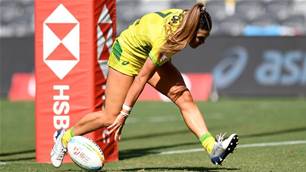
Caslick's ridiculous: What we learned from Aussies dominating Sydney Sevens

More Bretts than women as Rugby elections highlight diversity struggle





